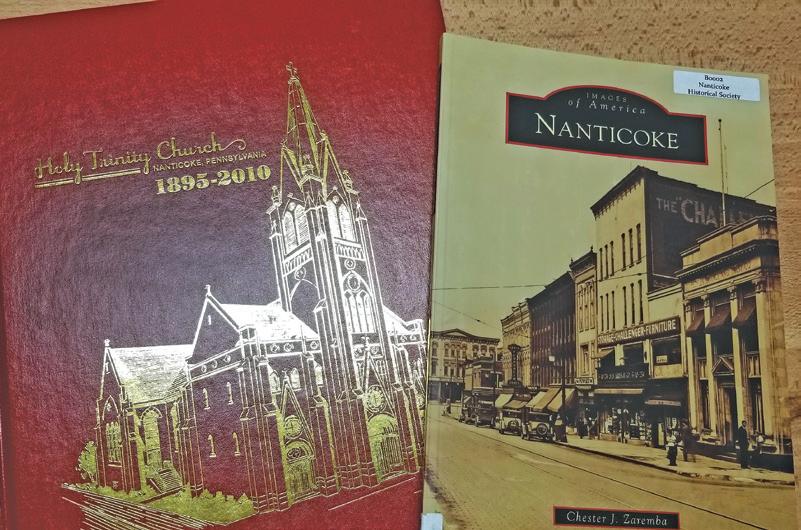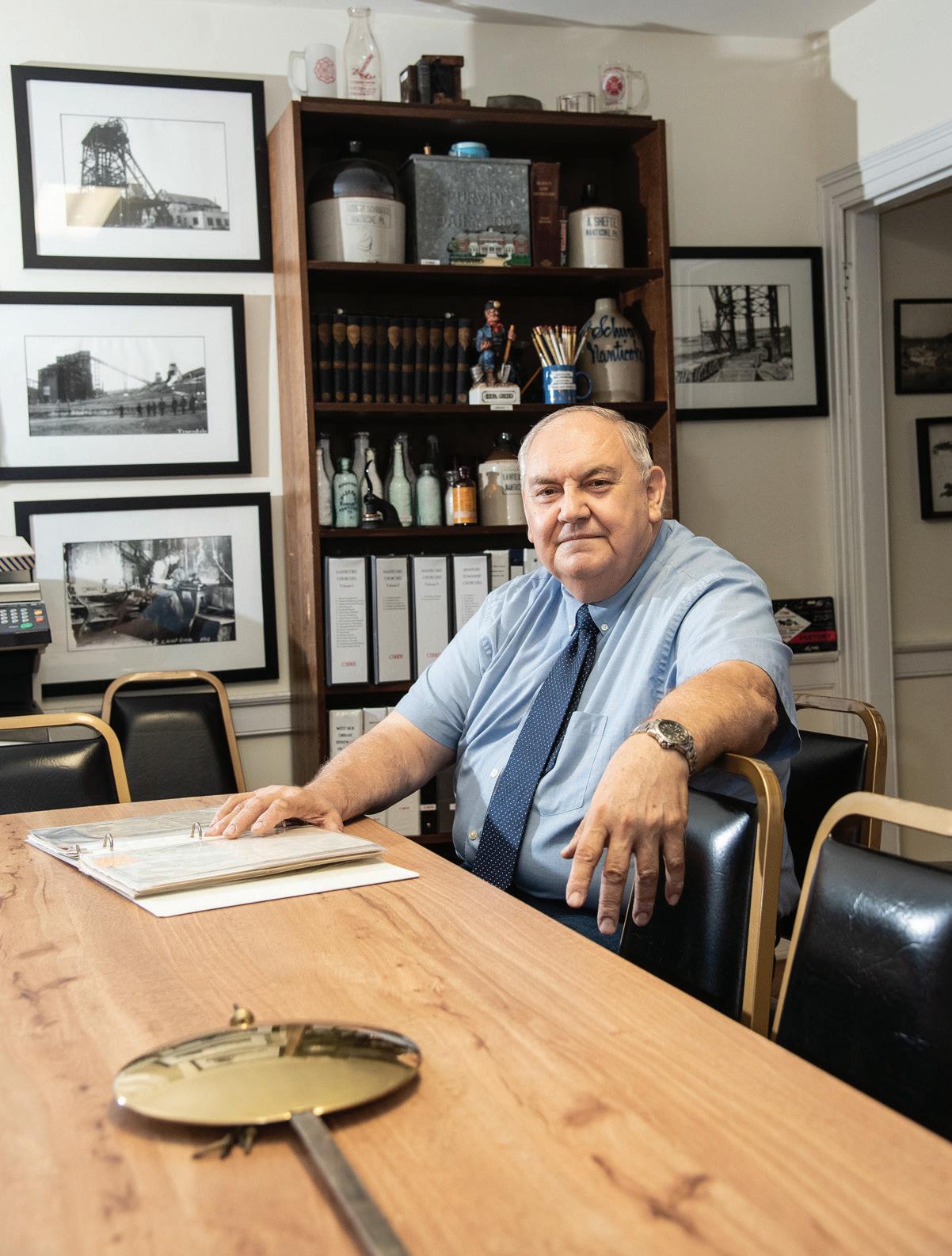
8 minute read
From Cop to Historian
“Your life is divided in thirds,” says Chester Zaremba ’79. “The first third is growing up, going to school. The second third is getting married, starting a family, and beginning your career. And if God gives you that last third, you take it and do what you have always wanted to do.” First Third
Zaremba’s paternal grandfather settled in Plymouth in the late 1800s. Not long after he and his brother were born, the family moved to Nanticoke, Pennsylvania in 1949. “I have lived in Nanticoke ever since,” Zaremba stated proudly. “I graduated from Nanticoke High School Class of 1963. Right after high school, I was more interested in cars than careers. I had no desire to go to college. But I did decide I wanted to do something, so I joined the Air Force at the end of the summer.” Zaremba says he originally wanted to be an air policeman, but because of his testing, the Air Force pushed him toward language school for a year at Syracuse University to learn Czechoslovakian. “The kid that didn’t want to go to college,” Zaremba jokes. He graduated in 1964, and was then sent to Goodfellow Air Force Base, an intelligence base, as part of the Air Force security team. “I was then sent to Germany at a listening post in January of 1965,” Zaremba recalls. “There were different linguists there: Russian, Bulgarian, and German; all listening to passing transmissions. I left the Air Force in 1967 and returned home.”
Advertisement
Second Third
Zaremba had been dating Henrietta since high school, and in 1967, they were married. He held a number of jobs, but never settled into one he liked. “In my high school yearbook,” Zaremba says, “I wrote my future career would be working with the state police. So one day I told my wife, I have to get this out of my system, I’m either going to do it or not.” Zaremba went out to the state barracks and applied to the state police. After his six months training at State Police Academy in Hershey he was assigned to Lock Haven barracks in 1972. “I was transferred to Montoursville from 1974 to 1980 and was assigned as a plain clothes patrol officer doing criminal investigations,” Zaremba says. “I was commuting to Montoursville from Nanticoke every day and had to buy a new car every two years.”
A friend of Zaremba told him the only way to get back to their home towns is to get promoted. So, Zaremba went through the Pennsylvania State Police promotional examination process. The higher you perform on the test, the more choice you have where to go. Zaremba scored third in the state, so he was able to come back to Troop P in the criminal investigation unit in Wyoming as a corporal. After a while there, he took the sergeant’s test and scored fifth in the state. He transferred to Towanda to be the station commander for a little over a year, then to Shickshinny as the station commander, and then Wyoming again in a supervisory position.
“My son was born in 1971,” Zaremba says. “I was moving around too much and was missing a great deal of my son Michael growing up. In the mid-70s, I received a letter from the VA that I still had GI Bill money left over after attending the police academy. I lived on Kosciusko Street, and Luzerne County Community College was right down the road. Zaremba enrolled at LCCC in the Criminal Justice program in 1974. He started part-time taking a few courses at a time.
“LCCC had a lot of great courses,” Zaremba recalls. “The students in the class wanted to be there. There was such a desire to learn, and the faculty knew the students wanted to learn. It was so different than my experiences in high school. One of my classmates was Gerald Dessoye, who went on to be the Chief of Police in Wilkes-Barre. He took that education and parlayed it into his life and used it in his career. My experiences at Luzerne allowed me to learn a lot about criminal justice, even though I graduated from the state police academy.”
One of the classes, Zaremba recalls, involved a criminal justice class where a guy comes in, pretends to “shoot” the instructor, and then runs out. The class then had to give a description of the shooter. “What was interesting was that all “witnesses” gave various accounts of what the guy actually looked like,” he says.
In addition to his criminal justice classes, Zaremba really enjoyed learning from his history classes. “The best course I ever had at LCCC was Two of the historical books Zaremba has Ethnic Studies authored “Holy Trinity Church 1895-2010” with Bob and “Nanticoke, Images of America” Janosov,” he says. “That class tied in with my interest in history. The way he presented the material on the early days of Nanticoke really represented the history of the Wyoming Valley.” He says the discovery of coal allowed for the mass in immigration of settlers from Eastern Europe. “The immigrants settled in with their own people,” he learned. “The Polish went to Nanticoke, the Irish went to Wilkes-Barre, and the Italians settled in Pittston. The course helped me understand the way we are. They say if you don’t know where you came from, you don’t know where you’re going.”
Come graduation time in 1979, Zaremba told his wife he didn’t know if he wanted to go to the graduation ceremony.

“I said to her, ‘I’m 34, a lot of these kids were just out of high school.’ My wife encouraged me to go and I went. We were all lined up in the parking lot. I’m standing there in the ‘Z’ line, a young lady comes by and says ‘I’m looking for Zaremba.’ I started to think, oh-no, they must have miscounted my credits, I’m not going to graduate; some major mistake was about to happen. She said ‘Would you come with me, you’re our honored graduate this year. You’re going to lead the class in and lead them out.’ Zaremba realized he had earned a 4.0 at graduation and thus the title. “I remember our graduation speaker was Jessica Savitch, best known for being the weekend anchor of NBC Nightly News and daily presenter of NBC News updates during the late 1970s and early 1980s. They guided me over to her, and we took some photos.”
Later on, in 1990, Zaremba earned the Outstanding Alumnus Award.
“My LCCC experience was well worth everything that I put into it,” he says. Zaremba was working out of Montoursville, he was coaching his son’s little league team, and going to LCCC. After years of homicide investigations with the state police and a great deal of traveling, he was offered the position as Chief of Police in the city of Nanticoke. “I thought it’s time for a change, and it’s my hometown,” he says. “I took the job in 1993.”
Zaremba made a great deal of changes to the police department from the technology to the organization of the department. “I had a good group of officers,” he says. “A good second-in-command and good detective. I wound up staying there for ten years until I retired in 2003. I spent 35 years in law enforcement and I had many other interests I wanted to pursue.”
Last Third
During his time as police chief in Nanticoke, the son of the former chief came in the office one day and remarked about the historical postcards of Nanticoke Zaremba had displayed around his office. “This led to a discussion on how it would be a great if Nanticoke had a historical society,” Zaremba says. “So we decided to start one.” Zaremba placed articles in the newspaper looking for people interested in starting the organization. “We began with a small group who met regularly,” he says. The group grew bigger, amassed more and more items and resources, and the Nanticoke Historical Society eventually settled into a home next to the Mill Memorial Library in Nanticoke.
“We service a lot of people,” Zaremba says. “We get a lot of genealogy requests. We had a population of about 26,000 people in Nanticoke during its prime of the coal industry in the 1920s. Many people were born here and later moved away as the coal industry faded. The descendants contact us to find information about their ancestors. We send pictures of gravestones, high school yearbooks, and whatever information we can find. They are looking for their roots and their roots are right here in Nanticoke.”
Zaremba says he still uses detective work in his new position to find information.
“My work at the historical society is similar to my detective work through my whole career,” he says. “When we are given a research task, we find a lead here and there and combine all that with research: photographs, newspaper archives, and documents to ‘solve’ the request.”
“This all comes back to my history classes at LCCC and how we all came together here,” he says. “Everyone wants to know their roots.” Zaremba says he always kept in touch with his professors at Luzerne and sought their advice. “Bob Janosov and Sheldon Speare helped my with many projects, from a dedicated marker for Concrete City, a historical site in Nanticoke; to a book I wrote and assembled about the history of the city. When I went to LCCC, it allowed me to get a different take on the way life works and helped me truly understand the role our history has for all of us. Luzerne was an incredible experience for me.”











